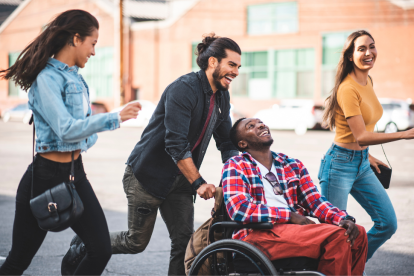Giving Thanks: Honoring First Responders, Health Care Workers, and All Those Dedicated to Helping Individuals in Need of Addiction and Mental Health Care

For Thanksgiving this year, take time to thank the workers who continue to be on the frontlines of the coronavirus pandemic as well as those dedicated to the care of those in need of addiction and mental health care. Whether you know someone personally or not, offering thanks is welcome and necessary.
Thanksgiving is a time to say thanks for everything you have and appreciate. Most important of all, be thankful this year for people, your loved ones, but also the people you don’t know who work hard to protect everyone else.
Any time of year is a good time to show gratitude for the first responders, medical professionals, and mental health care workers who keep others safe and healthy. Thanksgiving is a special opportunity, especially as these workers put their health and lives on the line to help others in need.
Frontline Workers Put Their Lives at Risk for Us
Emergency responders and health care workers risk their own safety and health on a daily basis, year-round. During COVID-19, the risk to their well-being only escalated. During the Thanksgiving holiday, it is more important than ever to understand what these essential workers did for all of us during the height of the pandemic, and what they continue to do for us on a daily basis.
All of these workers put their physical health at risk, even their lives. They put their well-being on the line to care for others. A review of studies of the impacts on health care workers indicated higher rates of COVD-19 as well as increased skin infections and rashes due to the required use of personal protective equipment.
What often gets overlooked is the impact of their work on mental health. First responders, health care professionals, and mental health workers all risk stress and burnout. This in turn can worsen or trigger other mental health conditions, like depression or anxiety disorder. It can also lead to substance abuse.
Studies of health care workers on the frontline of the pandemic showed they had increasing rates of anxiety, depression, and insomnia. The impact seemed to be worse for nurses than for doctors, and for female workers as compared to males.
How to Thank Health Care Workers and First Responders
Any time is a good time to show gratitude for essential health care workers and first responders. Thanksgiving provides a unique opportunity not just to be grateful, but to directly thank them. Here are some ideas for how to thank your local workers and examples of how individuals and communities are giving thanks right now:
- Send thank-you letters. You don’t have to know a frontline worker personally to write to them to show thanks. Address letters generally and send them to your local fire station or hospital to let workers know you appreciate them and their efforts. Many hospitals have online portals and contact forms set up specifically to allow you to thank workers.
- Help someone personally. If you do know a health care or emergency worker, a friend or family member, offer practical support. They may need help with childcare, grocery shopping, or chores around the house. Anything you can do to make their lives easier right now is a small but important way to say thank you.
- Send treats. Check with the fire department or hospital to find out their policies first, but if allowed, send treats. They will appreciate coffee, snacks, or even meals. If you see a healthcare worker or first responder in line for food or coffee, step up and pay for them as a way to say thank you.
- Make donations. A monetary donation to a health care facility or community health organization is a great way to say thanks. You can also donate items such as gloves, masks, and hand sanitizer. Find out what your local hospitals and health care facilities need and will accept.
- Thank You First Responder. This non-profit organization aims to support, honor, and thank first responders around the country. You can donate or check your local chapter for events and other ways to help. One of the group’s latest efforts is a mental health first aid program and training.
- Grateful Hearts. Anne Arundel Medical Center in Maryland launched this campaign to thank health care workers. By joining the movement, you can show support and thanks to their employees helping patients battle COVID-19. Check with medical centers and hospitals in your area to look for similar programs.
- Operation Gratitude. This organization thanks first responders, veterans, and active service military members through letter writing campaigns and care packages. You can write a letter or donate to the care packages.
Perhaps the most important thing anyone can do to thank essential workers is to avoid complacency. Individuals are still affected by COVID and variants continue to spread worldwide. Continue to follow safety guidelines and do your part to stop the spread of COVID-19. Follow your state’s and community’s regulations. Doing your part may seem small, but it’s a piece of a bigger puzzle and every piece counts.
The Importance of Mental Health Care Right Now
The Centers for Disease Control and Prevention reported that during the peak of the pandemic, 40 percent of American adults struggled with mental health issues and substance use. The most common problems reported included anxiety, depression, trauma, stress, beginning or increasing substance use, and suicidal thoughts.
Mental health is always important but often overlooked. During the coronavirus pandemic, mental health took a hit. People from all walks of life are vulnerable to mental health symptoms now, but health care and emergency workers continue to be at greatest risk.
Showing Gratitude for Mental Health Professionals
Physical health tends to take priority over mental health. Stigma associated with mental illness has long prevented many people from talking about it or getting help. During the pandemic, most of the gratitude and attention went to medical workers and first responders. They deserve thanks, of course, but it’s important to also recognize mental health professionals.
As with these other essential workers, mental health workers are at risk for being exposed to COVID-19, stress and anxiety, depression, and work-related burnout. They provide valuable services to everyone struggling during this difficult, stressful time. When taking time to thank first responders and medical workers, don’t forget the mental health workers.
You can do all the same things for mental health professionals as for other essential workers: send letters, donate to related organizations, send treats and care packages, and simply say thank you to those you know.
Take a little time this Thanksgiving to show essential workers that you care and are grateful. You may know someone personally who you can help and thank in person, but if you do not, go out of your way to support any health care or emergency worker. They will appreciate your acknowledgment and any practical support you can offer.
Our Mental Health, Addiction, and Co-Occurring Disorder Facilities
Constellation Behavioral Health provides innovative treatment programs for adults with mental health, addiction, and co-occurring disorders. At each of our Joint Commission-accredited facilities, we provide comprehensive assessments to ensure the best treatment for our clients. Our dedicated staff works together to deliver our excellent treatment outcomes within a shared, integrated system of care.






